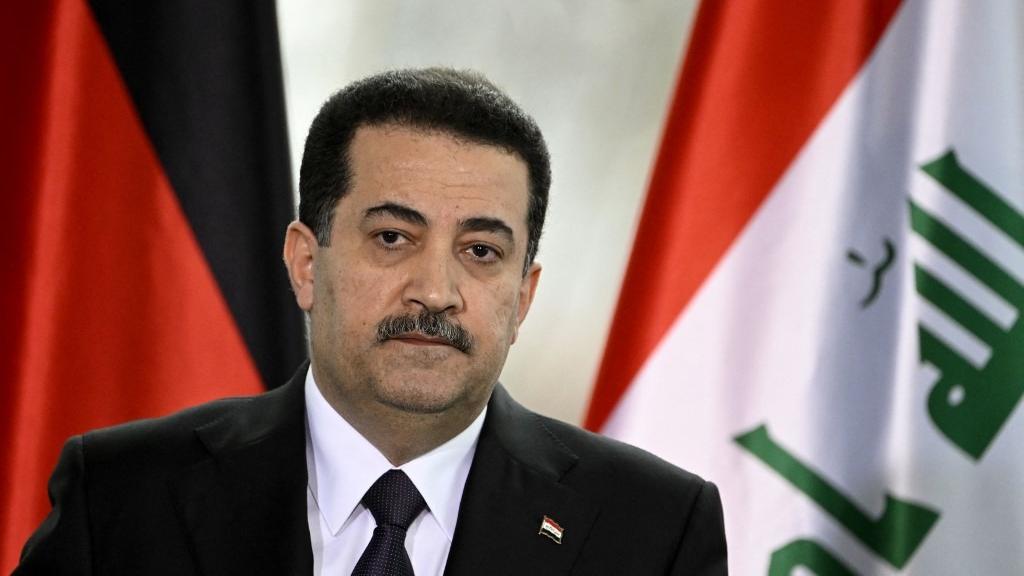 Iraq's Prime Minister Mohammed Shia al-Sudani and the German Chancellor (not in picture) give a joint press conference at the Chancellery in Berlin on Jan 13, 2023.
(PHOTO / AFP)
Iraq's Prime Minister Mohammed Shia al-Sudani and the German Chancellor (not in picture) give a joint press conference at the Chancellery in Berlin on Jan 13, 2023.
(PHOTO / AFP)
The Iraqi government’s decision to end the presence of US-led coalition troops on its soil marks a push for more stability within the country, analysts say.
The office of Iraqi Prime Minister Mohammed Shia al-Sudani has announced plans to start the process of removing the US-led international military coalition.
The office issued a statement on Jan 5, a day after a US drone strike killed a militia leader in the Iraqi capital Baghdad and drew anger among Iran-aligned groups in the country. On Jan 6, an adviser said they are to speed up negotiations.
The US Department of Defense noted that currently it has a military presence in Iraq as part of Combined Joint Task Force Operation Inherent Resolve, or known as the CJTF-OIR mission, which was “to advise, assist and enable partnered forces in the defeat of ISIS within designated areas of Iraq and Syria”
According to the US Department of Defense, US forces in Iraq conducted on Jan 4 a “self-defense strike”, which “killed Mushtaq Jawad Kazim al-Jawari”, citing him as a leader of the Harakat al-Nujaba “terrorist group” that is operating both in Iraq and Syria.
It claimed that Al-Jawari, also known as Abu Taqwa, “was actively involved in planning and carrying out attacks against American personnel”. Abu Taqwa, along with another member of Harakat al-Nujaba, were both killed in a strike that took place around noon in Iraq, a Pentagon spokesman said during a briefing on Jan 4.
In a statement released by the prime minister’s media office, Iraq called the strike a “blatant aggressions and violation of Iraq’s sovereignty and security”, as a drone “carried out an act no different from terrorist activities” by targeting one of the security headquarters in Baghdad, which resulted in casualties “and is unequivocally condemned”.
ALSO READ: PM: Iraqi govt moving to end US-led coalition presence
“The Iraqi Armed Forces hold the Global Coalition Forces responsible for this unwarranted attack on an Iraqi security entity that is operating within the powers authorized by the Commander-in-Chief of the Armed Forces. This action undermines the previously established understandings between the Iraqi Armed Forces and the Global Coalition Forces,” Yehia Rasool, spokesperson for the Commander-in-Chief of the Iraqi Armed Forces said in the statement.
“We view this action as a dangerous escalation and assault on Iraq, diverging from the spirit and the text of the mandate and the mission for which the Global Coalition was established in Iraq,” he added.
Mhd Nor Shakr, an international relations scholar at İstanbul Sabahattin Zaim Universitesi, noted that the main goal of the presence of the US-led coalition forces, estimated to number around 2,500, was to fight the Islamic State or ISIS.
“After the defeat of ISIS, the American presence became a burden In Iraq, and on the government,” Shakr told China Daily.
The US Department of Defense noted that currently it has a military presence in Iraq as part of Combined Joint Task Force Operation Inherent Resolve, or known as the CJTF-OIR mission, which was “to advise, assist and enable partnered forces in the defeat of ISIS within designated areas of Iraq and Syria”.
ALSO READ: Two airbases housing US-led coalition forces attacked in Iraq
Bilgay Duman, Iraq studies coordinator at the Center for Middle Eastern Studies in Turkiye, told China Daily that al-Sudani seems to be strategically positioning himself to manage immediate challenges and lessen the pressure.
This, he said, is particularly relevant in the context of the ongoing debates about the withdrawal of US troops from Iraq, a topic that is “not new”.
Duman said even under al-Sudani’s predecessor, Mustafa al-Kadhimi, the same issues were at the forefront during the “Strategic Dialogue” meetings with the US since July 2021, and that the two sides established the US-Iraq Higher Coordinating Committee in February 2023.
“These meetings may pick up pace soon, but a quick withdrawal of US troops seems unlikely, especially with the upcoming presidential elections in the US, which could delay such decisions,” said Duman.
READ MORE: Iraqi Shi'ite militia claims attacks on US bases in Iraq, Syria
He noted that al-Sudani’s government, which has been in power for a year, “has brought a certain degree of stability, something relatively new compared to previous periods”. “However, he is under significant pressure from Shiite militia groups. The harder the US stance against these militias in Iraq, the more pressure al-Sudani faces. He’s looking to alleviate this pressure, especially since 2025 will be an election year in Iraq,” said Duman.
At the same time, Iraq is trying to position itself as a “balancing force” in the Middle East, he said. However, regional conflicts “are making this difficult, often spilling over into Iraqi territory”, creating challenges for Iraqi administration, Duman said.


